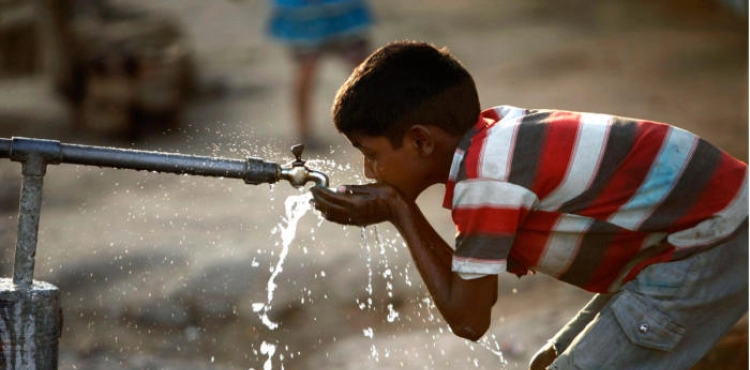The Al Mezan Center for Human Rights said today, Monday, that 97 percent of the water in the Gaza Strip is unfit for human consumption according to the standards of the World Health Organization, and that 95 percent of the Strip´s population of nearly two million people do not have access to water. Safe.
These statistics came in a statement by the center on the occasion of the World Water Day, which falls on the twenty-second of March of each year, which was launched by the United Nations in 1993.
The center pointed out that the Israeli authorities and their quasi-governmental institutions since 1967 have intentionally prevented Palestinians from accessing and controlling water resources throughout the occupied Palestinian territories, such as the Jordan River, which constitutes a serious violation of their inalienable right to self-determination, including: That permanent sovereignty over wealth and natural resources is a fundamental pillar of this right, and it also sets conditions before implementing any development projects for the Palestinian water sector, most notably obtaining Israeli approval, and not allowing the entry of spare parts and materials needed to rehabilitate the infrastructure of the water sector. The ability to develop the water sector.
Some human rights organizations indicated that the discriminatory policies practiced by the occupation authorities and their quasi-governmental institutions in the water sector fall under what they called "water apartheid," which amounts to a crime against humanity under the Rome Statute of the International Criminal Court.
The Gaza Strip in particular suffers from a chronic and fabricated crisis in obtaining safe drinking water and sanitation facilities. In addition to the Israeli occupation and the apartheid regime imposed on the Palestinian people for decades in a row, the Israeli authorities imposed for the thirteenth consecutive year a blockade and a comprehensive closure on the Gaza Strip. This is considered unlawful collective punishment under international law for nearly two million Palestinians in the Gaza Strip, the closure and large-scale military attacks targeting civilians and infrastructure in the Strip have undermined all aspects of life, including the deepening of the water and sanitation crisis, in addition to the collapse of other basic services.
In this regard, the United Nations report issued in August 2012, entitled "Gaza in 2020 - a suitable place to live?" Emphasizing that the Gaza Strip will not be suitable for living by the year 2020, unless urgent measures are taken to improve the water supply, electricity, health and education services, as he indicated the low levels of safe water in the Strip in a way that is not commensurate with the increasing demand, which exposes the population to the risk of contracting infectious diseases in addition to Other risks threatening them.
Despite repeated international warnings, the year 2021 has solved the problems of the sector, foremost of which is the water problem.
For many Palestinian families in Gaza, safe and fresh water means water that is very expensive and inaccessible, and this is due to the lack of purchasing power to fill domestic water tanks or buy bottled bottles as a result of the deteriorating economic situation and high levels of poverty among the population. Availability, and the scarcity of water means the inability to take basic safety and prevention measures, such as frequent hand washing to protect against the Coronavirus pandemic, as for the Palestinian agricultural community in the restricted access areas imposed by the Israeli occupation within the territory of the Gaza Strip, water means the ability to work and agriculture Prosperity, as it may also be associated with the opposite, i.e., destruction.
It should be noted that the occupation forces have built a number of water dams along the eastern and northern regions of the Strip, with the aim of preventing the natural flow of rainwater and depriving the underground reservoir of the sector of its sources of nutrition, and when the dams are too full, for fear of their collapse, especially after heavy rains in the area, The occupation forces suddenly open the dams´ waters towards the property of citizens in the Gaza Strip, without warning the residents or the competent authorities.
The Al-Mezan Center for Human Rights denounced what was stated in the statement of the United Nations Special Rapporteur on the situation of human rights in the occupied Palestinian territories, in which he mentioned "the collapse of natural sources of drinking water in Gaza, which has become a strong indicator of the systematic violation of human rights in the occupied Palestinian territory."
The Center called on the international community to assume its moral and legal duties towards the Palestinian people and ensure that they enjoy their water rights that require equal, comprehensive and non-discriminatory access to safe water, stressing the need to activate accountability and justice mechanisms for all violations of international law in the occupied Palestinian territories, including water-related violations.












